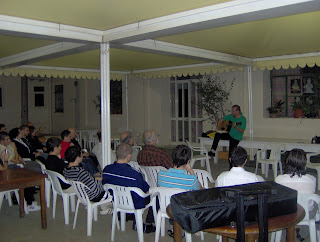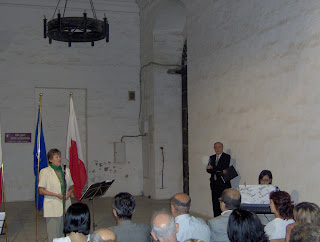

Left: Poet and DLS teacher Mario Attard; Right: Poet and artist Stephen Morris

Din hija blog li tikkonċentra fuq il-letteratura kemm Maltija kif ukoll barranija. Huma inklużi wkoll aċċenni għal ħwejjeġ interessanti marbutin mal-kultura. Ara wkoll il-blog tiegħi www.pagnawarapagna.blogspot.com għal reċensjonijiet u studji dwar kotba differenti.



 1 Salv Sammut u s-safar. Din kienet għażla volontarja jew seħħet minħabba raġunijiet ta’ xogħol?
1 Salv Sammut u s-safar. Din kienet għażla volontarja jew seħħet minħabba raġunijiet ta’ xogħol?4 Il-versi tiegħek għandhom kemm mill-poeżija kif ukoll mir-riflessjoni! Liema minn dawn iż-żewġ aspetti tpoġġi fl-ewwel post?
7 Il-poeżija hija vjaġġ filwaqt li fil-vjaġġ hemm il-poeżija. Kif tirreaġixxi għal frażi bħal din?
Patrick Sammut (Ottubru 2008)
Poezija:
JIEN RAJT WAQT LI KONT G}ADDEJ
(Mejju 27, 2008)
- Salv Sammut -
Jien u g]addej minn fost il-kotra m[enna
ta]bat f’xulxin b]an-nemel ]awtiel
ti[ri wara l-]in-eternità
bla sabar f’destinazzjonijiet differenti;
in]ares u nifli b’]arsa ta’ skrutinju
lejn dil-folla mitlufa
fis-subkonxju individwali.
Rajt mara adultera tibki dmug] il-madalena
fl-istazzjon u fit-tara[ ta’ l-underground
tistenna lil bniedem-klijent
tiela’ bl-escalator g]al kirja mla]]ma tal-midinba
ma’ dmug]ha mxerred ja]sel l-g]elt l-umanità.
Rajt direttur-e\ekuttiv bil-mobajl ma’ widnejh
jag]ti struzzjonijiet biex bi sforz kollettiv
ilkoll ifasslu l-mod manipolattiv
ta’ kif b’diplomazija u strate[ija fina
jg]elbu l-avversarju kompetittiv.
Rajt tallab im`er`er jifrex il-mitra] tal-kartun,
u qabel jag]laq g]ajnejh im\ell[a mit-trakomja
jisma’ f’widnejh il-]oss itarrax tat-tren fuq il-linji
u jist]ajlu damdim fil-profondità ta’ ru]u;
i]ares imqit lejn l-indifferenza tal-kotra
g]addejja bla kompassjoni minn ]dejh.
Rajt mera [ewwa vetrina ta’ Spi\erija
u fir-riflessjoni tag]ha dehret il-mara adultera
tibki dmug] l-intolleranza tas-so`jetà;
g]adda d-direttur-e\ekuttiv f’manipolazzjoni
jikkompeti mal-]a\en tal-kompetitur;
xiref it-tallab jimtedd fuq il-mitra] tal-kartun
jis]et l-ingratitudni tal-bnedmin.
I\da fuq kollox, fihom kollha lma]t lili nnifsi
fl-isfond tal-mera li tikxef kull verità;
bniedem solitarju b’apatija kbira
iterraq fit-toroq tal-belt kosmopolitana
fis-skiet tas-solitudni
g]addej fost il-kotra li qed tg]ix
f’dinja ta’ egoi\mu sfrenat.
Salv Sammut ghadu kemm ippubblika antologija poetika bl-isem ta' TIZWIQA (2008)

A Bridge of Peace
"They shall sit every man under his vine and under his fig tree,and none shall make them afraid." (Micah, 4, 4)
My Arab sister,
Let us build a sturdy bridge
From your olive world to mine,
From my orange world to yours,
Above the boiling pain
Of acid rain prejudice -
And hold human hands high
Full of free stars
Of twinkling peace.
I do not want to be your oppressor
You do not want to be my oppressor,
Or your jailer
Or my jailer,
We do not want to make each other afraid
Under our vines
And under our fig trees
Blossoming on a silvered horizon
Above the bruising and the bleeding
Of Poison gases and scuds.
So, my Arab sister,
Let us build a bridge of
Jasmine understanding
Where each shall sit with her baby
Under her vine and under her fig tree -
And none shall make them afraid
AND NONE SHALL MAKE THEM AFRAID.
 WHAT DO I EXPECT ?
WHAT DO I EXPECT ?








 Kilin at his desk
Kilin at his desk Charles Magro compering and the
Charles Magro compering and the 



 Alexander Craus, Mayor of Rabat
Alexander Craus, Mayor of Rabat
 I came to know poet and writer Therese Pace from B'Kara during one of the Poetry Evenings organized regularly by the Maltese Poets Association. This means that I knew her even before she published her winning (and first) poetry anthology, Arpeggi, back in 2003. What I can say about Therese Pace is that her poetry is real and that she is one of the best female poetical voices here in Malta. Her poetry in Maltese, English and Italian is published and acknowledged in Malta but also abroad. And yet as a person she is so humble. Therese Pace, keep it up and best of luck. Visit her website: www.freewebs.com/theresepace
I came to know poet and writer Therese Pace from B'Kara during one of the Poetry Evenings organized regularly by the Maltese Poets Association. This means that I knew her even before she published her winning (and first) poetry anthology, Arpeggi, back in 2003. What I can say about Therese Pace is that her poetry is real and that she is one of the best female poetical voices here in Malta. Her poetry in Maltese, English and Italian is published and acknowledged in Malta but also abroad. And yet as a person she is so humble. Therese Pace, keep it up and best of luck. Visit her website: www.freewebs.com/theresepace I came to know Dorin Popa for the first time thanks to some photographs he sent through internet of Christmas (2007) in Iasi. And this, again, through my contacts with Teresinka Pereira. Last May/June I went on an educational visit to Iasi but could not meet Prof. Popa because we were both busy with other things. However, I managed to give him a set of poetry books written by the members of the Maltese Poets Association.
I came to know Dorin Popa for the first time thanks to some photographs he sent through internet of Christmas (2007) in Iasi. And this, again, through my contacts with Teresinka Pereira. Last May/June I went on an educational visit to Iasi but could not meet Prof. Popa because we were both busy with other things. However, I managed to give him a set of poetry books written by the members of the Maltese Poets Association.
 The poets and members of the Maltese Poets Association who
The poets and members of the Maltese Poets Association whoPeople present at the evening in Sliema - Lino Grech (first row, left) and President of the MPA, Alfred Massa (first row, second from left).
On 12th September the MPA organized another evening, this time in Sliema at the Don Bosco Hall. On this occasion member Lino Grech launched his three new books (Hajja ta' Bniedem, Gherf il-Bniedem and Non Omnis Moriar), short stories and poems. The evening was presented by secretary Charles Magro, and singer and musician Walter Micallef played some of his best pieces. President, Alfred Massa, insisted on the importance of the MPA to help her members in the publication and diffusion of their poetry. Members of the MPA read a number of poems and parts of Lino Grech's short stories. Patrick Sammut gave a short speech about Lino Grech's poetry and prose in these three new books. Those present were treated to a reception after the evening.